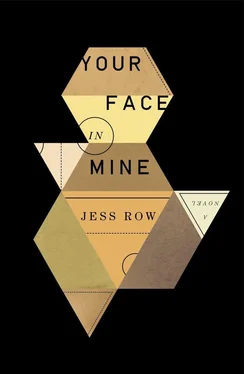But did you get a sense of why she wanted to do this?
Martin pulls at his earlobe, as if testing whether it will stretch. Yes, he says, I mean, yes , we thought so, and no, as it turns out, not at all. She started off saying that it was a scholarly project. Immersion. That’s what anthropologists do. She’s been studying body modification for years, you know, sort of shopping around, looking at tattoos, scarification, revirginizing, eye surgery — you know that’s huge for Koreans, right? — and when she found us, she sort of realized that this was it. She wants to drop a bomb on the whole scholarly world. More power to her, I said. But then she came in with these pictures — she wanted to be a cross between Kate Moss, Mariel Hemingway, and Gwyneth Paltrow. I mean, the whitest of the white. We’re talking about stuff Silpa hadn’t even really considered. She wasn’t satisfied with wearing contacts the rest of her life; she wanted retina replacement. Freckles. She wants to be the kind of white girl who doesn’t tan. White like in an Ingmar Bergman movie. White like she’s lived on some island in Maine her whole life.
And Dr. Silpa agreed to do it?
For him it’s sort of the final frontier. Whiteness is tricky, too, you know. Look what happened to Michael Jackson. Of course, I mean, his methods were crude. But no matter what, it’s always about taking something away . You practically have to go back into the gene pool to make it right. The basic technology is simple, as I understand it, but it can only do so much. To get that ultra look, that Tilda Swinton thing, you have to go in there and strip all the melanin away. It’s practically like introducing albinism. I don’t understand the chemistry; Silpa can explain it to you. But Julie-nah — aren’t we supposed to be calling her Julie? — she said, no matter how much it costs, no matter how long it takes. Here’s one thing we found out: she’s not living on a professor’s salary. Her father was an executive at Samsung. There’s serious money there, though she’s done all she can to hide it. Never talks about him. Never talks about her family at all. No phone calls home, nothing.
Our driver, a different driver from the one the night before, is sucking on a piece of sugarcane as if it’s a cigarette. Tall, gaunt, very dark, with charms tattooed the length of both forearms, and a Bluetooth headset blinking on his right ear. This is Kham, Martin says, following my gaze. Kham, ni kheu peun khung chan Kelly.
Sawatdi krup, he says to me.
Sawatdi krup, I say, automatically, and turn to Martin with what I hope is a politely questioning look and not blank astonishment.
You speak Thai?
Some, he says. Not as much as I’d like to.
Anything else you want to tell me? While we’re on the topic of surprises?
He laughs and leans back in his seat, and for the first time, I take in the whole picture: white baggy linen pants, woven sandals, and a loose, silky, salmon-colored shirt. Half exclusive spa, half Third World oligarch. But whatever he thinks he’s trying to be, it’s working. Something about him is unclenched, slackened, unwrapped, unwound.
You’re looking for an apology, he says. Okay. I didn’t give you the whole picture. It was kind of a need-to-know situation.
I didn’t need to know that there were others?
Did you press me on the specifics of what was going on over here? I didn’t hear that. We had all that other drama to work out, remember?
It changes the whole picture. If you’re not the only one, I mean, why talk about just you? Why not make it a group portrait? Because you’re the first American? Because you’re the first African American?
Because I’m the leader. The instigator. The public face.
The owner, you mean.
He unscrews the top of his water bottle deliberately and takes a long swig, the cords in his throat distending with the effort.
You’re going to deny it?
Deny what? he says. What does own mean, exactly, Kelly? Non-Thais aren’t allowed to own majority shares in Thai companies. Silpa’s name is on the incorporation forms. President, founder, and CEO. And I wasn’t the only one to capitalize it, either. I’m a minority shareholder, actually. Twenty percent. Officially, I’m a board member. And an independently compensated spokesperson and PR consultant. And anyway, five percent of the shares are compensation just for participating. For being an experimental subject. Tariko and Julie-nah each have five percent, too.
So who else is involved?
You mean where did the actual money come from? Lots of places. Silicon Valley. China. Russia. Oman. Mostly that was Silpa’s doing. He has some very loyal customers from back in his sex-change days. People came from everywhere. They say that in the area of genital reconstruction — shaping the penis, making the labia — he’s the best that ever was. Other procedures, too; off-the-books stuff, things that aren’t supposed to be possible. And total discretion. Don’t bother him asking about it. The point is, the money’s there. In his world, money’s always there.
And all those people, whoever they are, they know what the Orchid Group does?
Not in any detail, he says. We’re not talking about active investors here, Kelly. They trust Silpa. That’s the main thing. They know it’s some new initiative of his, some new procedure, and that’s about it. The actual money amounts to them are pocket change. Two million here, three million there. We’re talking about people that place hundreds of bets like this. Silent partners. Some of it actually came in in cash. And in gold. Stock swaps, other kinds of things. Thailand’s a good place for assets to hide.
Then what do you do, Martin?
Run the website. Run the housing. Where you’re staying, I mean. People who come to Bangkok for this kind of work can’t stay in the Dusit like they’re getting a nose job. The privacy has to be absolute, for one thing. And we’re talking about six months, at a minimum. Eventually we’ll have houses all over the city. I tell you, as much as anything these days, I’m a real estate investor. Can’t tell you how many places I’ve looked at. And staffing. Gardeners, cooks, drivers, secretarial. Tariko won’t be around forever, more’s the pity. There’s plenty of Rastas in Thailand; I keep telling him he should stay and open a backpacker café or something. But for him it’s Jamaica or nothing.
We’ve pulled out of street traffic and up onto an elevated highway: Chalern Maha Nakhon Expwy, the sign says, in English and Thai. From this height, Bangkok looks almost a little like Los Angeles: blue-tinted office buildings, sullen concrete apartment blocks, billboards for Minolta and Pepsi and the iPhone, shopping malls with garish neon signs, palm trees poking their dandelion heads up everywhere. Only it never ends. I sit up straight, my stomach lurching, and twist around, taking in the three-sixty view. The city stretches out, edgeless, bordered by its own haze. I count what look like six separate downtowns. The traffic shifts and slings around us, fast even by Van Wyck or 405 standards, something tense and manic in the way the taxis swap lanes, six inches closer than American drivers would allow.
Fourteen million people, that’s the conservative estimate, Martin says. And it’s flat. Nothing but rice fields to hem things in.
Uh-huh.
Look, I’ve been to any number of big cities. So have you. On a certain level, as a businessman, you don’t have to tell them apart. You don’t want to. One five-star hotel is as good as the next. You just want to make your point and get home. But I’ll tell you something: you’ll never find a big city, a megacity, less anxious than this. What I realized, right away, once I got here: these people know how to live. It’s like Paris, only with humility, or Tokyo without that robotic politeness. Thailand was never colonized, right? So there’s no inferiority. They never got all wounded and fucked up, like the Indians, the Africans, the Arabs. Thai culture is like a cell; it works through osmosis. There’s a flow, a give-and-take. That’s the Buddhist way. So you get these amazing secretaries who speak three languages, can run a spreadsheet like nobody’s business, understand foreign exchange and how to get stuff through customs, use smartphones and listen to Dvorák, and then you get to talking with them and you realize they believe that their family apartment is still haunted by their grandfather’s ghost, and they have to go pay five thousand dollars to a monk at some wat in the middle of nowhere, upcountry, to perform a remote exorcism or some shit like that. And the thing is, it’s all okay! It works! These are some seriously unconflicted people, that’s what you have to understand. We like to think we’re comfortable with absurdity. They don’t even see it that way. It’s all continuity to them. Frankly, I aspire to the Thai condition. Not that I’ll ever get there.
Читать дальше












